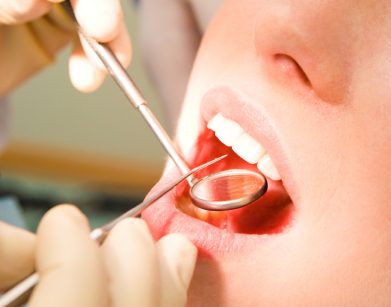Q&A: Should you have your wisdom teeth removed?
Wisdom teeth aren’t just a problem for teens’adults may still need surgery in their 40s or 50s. Read on for smart advice about wisdom teeth removal

Source: Web exclusive: May 2011
What are wisdom teeth?
You have three molars on each side of your upper and lower jaws, for a total of 12. The wisdom teeth are third in line, right at the back. You may not have all four wisdom teeth; according to Dr. Curtis Gregoire, assistant professor in the faculty of dentistry at the University of Dalhousie, about 30 percent of people are missing one or more.
Why might I need to have my wisdom teeth removed?
Often, wisdom teeth don’t grow in properly. A tooth is ‘impacted’ if it’s prevented from reaching its normal position (say, by obstruction from tissue or another tooth). Impacted teeth can cause problems with chewing or periodontal problems and damage adjacent teeth. A tooth can be partially impacted’it has broken through the surface of the gums but can’t grow into a normal position. Dentists can determine which teeth won’t grow in properly.
Impacted wisdom teeth may hurt, and they can develop cavities, infections or periodontal disease. It’s often when these problems arise (as well as during regular dental exams) that people realize they need to have their wisdom teeth extracted, says Dr. Gregoire.
Some people never need surgery’their wisdom teeth grow into proper position, or the teeth stay in the jawbone and don’t cause problems. Others don’t need surgery as young adults, but their wisdom teeth may cause problems later in life.
When should I have my wisdom teeth removed?
In general, it’s best to have wisdom teeth taken out between ages 16 and 22, says Dr. Gregoire. Like other teeth, wisdom teeth develop in the jawbone. The crown of each tooth is formed first, and it’s pushed up when the root of the tooth develops. In young adults, ‘the formation of the root is not complete, so there are fewer complications and risks.’
What’s the extraction procedure?
You’ll be sedated (typically with intravenous anaesthetic). Once you’re comfortable, the dentist administers a local anaesthetic. The surgery takes 20 to 30 minutes. Afterward, you’ll spend time in the recovery room. Ask a family member or friend to take you home.
Recovery time depends on your age and the degree of tooth impaction; for younger patients, the swelling and discomfort may last three to five days. Your dental professional may prescribe pain medication.
What are the risks of wisdom tooth removal?
You may feel added discomfort if one of the blood clots that form in your tooth sockets post-surgery becomes dislodged’this is called ‘dry socket’ and is the most common complication (smokers are more prone to this). And, as with any surgery, there’s a risk of infection.
The most serious potential problem with wisdom teeth extraction is nerve injury. Over time, the roots of your wisdom teeth will become fully developed and your jawbone denser. The older you get, the more difficult the surgery is. ‘There’s a nerve in the jawbone below the roots of the teeth, and the main risk is injury to that nerve, which can cause numbness in the lower lip,’ says Dr. Gregoire. ‘Roots grow down toward the nerve, so that risk is somewhat higher if the tooth is impacted with a fully formed root. The risk is extremely low if the roots are not formed.’
Is there an age when it’s too late to have wisdom tooth surgery?
‘It’s not uncommon for impacted teeth to become symptomatic when people are in their 30s, 40s or 50s,’ says Dr. Gregoire, who regularly sees older adults for wisdom tooth removal. ‘There’s no age limit, but as you get older, the surgery is more difficult, recovery is more difficult and the risk of complications is higher.’
If your dentist recommends surgery, don’t wait. Dr. Gregoire often sees patients who have cavities in their impacted teeth and the adjacent teeth, which may also have to be pulled. ‘I see cases like that every week,’ he says. ‘People put it off and put it off, and they end up losing eight molars instead of four.’
Don’t miss out! Sign up for our free weekly newsletters and get nutritious recipes, healthy weight-loss tips, easy ways to stay in shape and all the health news you need, delivered straight to your inbox.




